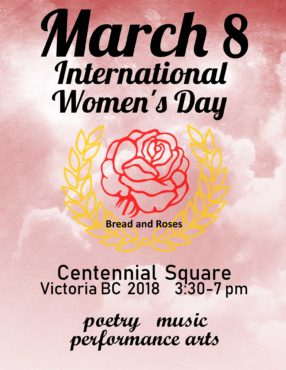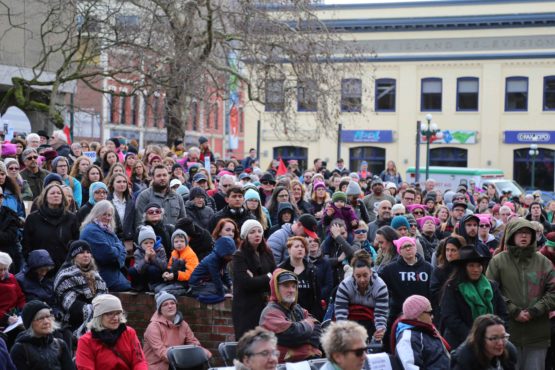An all-ages group of women crowds around a table in the Germanic and Slavic Studies reading room. The window is open and the icy wind that wafts in is a welcome contrast to the warm Clearihue air. It’s only six o’clock, but it’s already dark outside. Most students have gone home for the day, but these activists are just getting started.

Poster for the International Women’s Day Festival. Photo provided
Students and members of the community have gathered to go over the details for the International Women’s Day Victoria festival they’ve been planning. Sharon Hazelwood, co-organizer, tucks her pink and grey hair behind her ear and pulls out a pencil, and Cayla Naumann, co-organizer of the Women’s March Victoria, opens her laptop. They’re ready to begin.
The meeting is loud and fast-paced. Things are falling into place and the room is buzzing. “It’ll be activist women speaking their minds through song and dance,” says Barbara Mitchell-Pollock, co-organizer. The festival at Centennial Square will run from 3:30 p.m.–7:00 p.m., and will feature singers, dancers, and poets, she tells the group. There will also be a sign-language interpreter and Brianna Dick from the Songhees Nation will be opening the program. She will be “honouring the land and welcoming people to the land,” says Mitchell-Pollock.
Additionally, bread and some roses will be handed out at the festival in conjunction with the eponymous theme for International Women’s Day Victoria this year, explains Mitchell-Pollock. ‘Bread and Roses’ is a political slogan derived from Rose Schneiderman’s speech regarding the Triangle Shirtwaist Factory fire in 1911. “The worker must have bread, but she must have roses, too,” said the feminist labour union leader in her speech. This line inspired a poem, a song and now, the team that is planning International Women’s Day Victoria.
History
“International Women’s Day was historically [used] to commemorate the fight for women’s rights,” says Linaya Bertschi, a third-year student doing a double major in Gender studies and Germanic and Slavic studies. “The first celebration was held in New York in 1909 and then was exported to Germany and Russia,” says Dr. Katrina Sark, a sessional professor at UVic who teaches in multiple departments, including Gender studies and Germanic and Slavic studies.
“In places like Russia, it’s [a] very big deal. Every single woman gets flowers,” says Sark, who co-organized Victoria’s Women’s March and is publishing the Anthology for Social Justice and Intersectional Feminisms. “It’s so visibly marked as this one day when you should remember all the women and all the work they do for everyone else.”
It’s a spectacle in Europe, she says, but in North America, most people aren’t even aware of what International Women’s Day is and why it’s celebrated. “In Canada, it’s this odd international thing that we kind of know about but don’t really talk about.” We’re also very quick to dismiss the history, says Sark. She thinks this is because International Women’s Day is “not as commercialized as Valentine’s Day or Mother’s Day.”
Importance
Sark acknowledges that International Women’s Day can be seen as a token gesture — like saying “‘the rest of the year, it’s not your day,’” but others find plenty of sincerity in the day.
“[International Women’s Day] means coming together in solidarity,” says Melanie Kleinschmidt, a member of UVic’s Young Communists club. “Women’s liberation is synonymous with the liberation of all people.”
“It’s a party,” says Bertschi, who is volunteering at the festival. “International Women’s Day, especially in Victoria, is a time to celebrate all of the achievements that women have made throughout the year.” It’s also a day to “experience art . . . that may not always be showcased due to the gender of the creator,” she says.
Bertschi feels that International Women’s Day is important because equality is something we’re still working towards. It’s a day to “look back and celebrate how far we’ve come, as well as a time to plan to continue to change things for the better,” says the third-year student activist.
The overall theme for International Women’s Day this year is #PressForProgress. For Sark, that means continuing to push through the doors that have finally been opened. “We’re entering another boiling point moment,” says Sark, “and I think that’s where I see progress.”
According to her, the original Women’s March in January 2017 opened the door for further initiatives to empower women, such as #MeToo and the #TimesUp campaign, to go viral.

A photo from the 2018 Women’s March. Photo by Belle White, Photo Editor
“Out of that,” she says, “I think women became a little angrier, a little more empowered, [and] a little more daring.” Sark saw more women gaining the confidence to speak their truth, and stand in solidarity with women from around the world. Now, she says, we’re aware of these superheroistic women.
Mitchell-Pollock says that while progress is extremely important, an additional critical focus for this year’s event is inclusivity. She mentions how proud she is to see women of all different generations and backgrounds coming together to make this festival happen.
Privilege is also on the minds of these organizers as they make their plans and learn about social justice. “I do realize that there is a big grain of privilege that comes with access to this kind of knowledge,” says Stark.The organizers understand that every decision matters — even choosing the poster design — and we can’t just celebrate able, white women.
“We can’t send that message anymore in 2018,” says Sark. Tasteful inclusivity is a priority for Sark and the other organizers, and they are constantly reminding themselves of how important it is to check their positionality and privilege.
How To Celebrate
“International Women’s Day is meant to be a celebration!” says Bertschi. So how should people celebrate on March 8?
“Thank the women in your life for being the boss ladies that they are, and think about how you can be a better ally to the people around you for the upcoming year,” she says.
Bertschi will be at the festival during the day, and will be attending the launch party for Sark’s Anthology for Social Justice and Intersectional Feminisms at the Greater Victoria Public Library. The launch will begin at 7 p.m. and will include a panel of the contributors who will be discussing various topics related to International Women’s Day.
If you’re looking to get involved on March 8, Sark says the group always need volunteers. She urges students and members of the community alike to get involved in social justice work.
“Do whatever you [can] do because this is the only time in history that you’ve had the power to do this,” she says. “There’s no excuse anymore to say that ‘this is not my fight!’”
This headline has been updated to better reflect the organizers of the festival.







